STATEHOUSE REPORT | ISSUE 23.19 | May 10, 2024
BIG STORY: Session ends with unfinished business
MORE NEWS: Big energy bill dies as session ends
LOWCOUNTRY, Ariail: #@+*^$ Dominion
COMMENTARY, Brack: Most regressive legislative session in decades
SPOTLIGHT: Riley Institute at Furman University
MYSTERY PHOTO: Old white building
FEEDBACK: Send us your thoughts
Session ends with lots of unfinished business
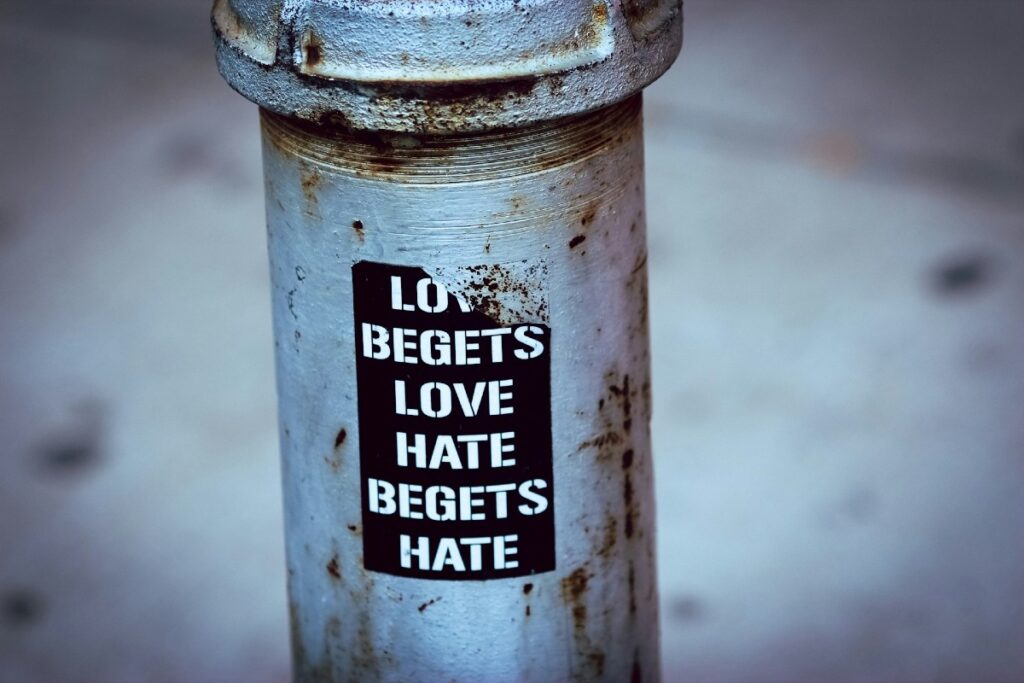
By Jack O’Toole | As the 2024 session of the South Carolina General Assembly ended Thursday, lawmakers of both parties were more focused on the bills that failed than those that passed.
Senate Minority Leader Brad Hutto, D-Orangeburg, called it “a session of misses.”
“We missed on medical marijuana, we missed on healthcare restructuring, we missed on energy, (and) we didn’t even get to hate crimes” he said. “These were bills that were important to quality of life and the way we treat our citizens.”
A slow suffocation

Of particular concern was the proposed Clementa C. Pinckney Hate Crimes Act, a bill named after the state senator and Emanuel A.M.E. Church pastor who was murdered along with eight of his parishioners by racist gunman Dyllan Roof in 2015. The bill would have stiffened penalties for crimes motivated by race, color, religion, sex, gender, national origin, sexual orientation, or physical or mental disability. This was the second session in a row in which the bill died without a vote in the Senate.
South Carolina is one of only two states without a hate crimes law.
“We just wasted a lot of time,” bill sponsor and Rep. Wendell Gilliard, D-Charleston, told Statehouse Report. “Now I’ll have to reintroduce the bill again next year, sad to say.”
Richland Democratic Sen. Darrell Jackson shared Gilliard’s frustration, saying that what disappointed him most was the way the bill was killed without the courtesy of an up-or-down vote.
“If the other side feels we don’t need it, let us debate that,” Jackson said. “But this was the worst way to go down – because, quite honestly, it was spineless.”
A last-minute demise
Even more dramatic than the slow suffocation of the hate crimes bill was the last-minute demise of health care restructuring legislation that was a major priority of S.C. Gov. Henry McMaster and leaders of the House and Senate. The bill would have consolidated South Carolina’s sprawling health care bureaucracy into a single streamlined entity reporting to McMaster.
The legislation died with only moments left in the session when Spartanburg Republican Rep. Josiah Magnuson raised a procedural objection that couldn’t be addressed before time ran out at the legally mandated hour of 5 p.m. Magnuson is a member of the House Freedom Caucus, a far-right faction that’s been crossing swords with G.O.P. leaders since January.
Late Thursday, Magnuson told reporters he’d killed the bill because leaders hadn’t allowed sufficient opportunities for debate and amendments.
“If the bill is good for South Carolina, which I don’t believe that it would have been,” Magnuson told reporters, “then it’s House leadership’s fault for not allowing the bill to be fixed.”
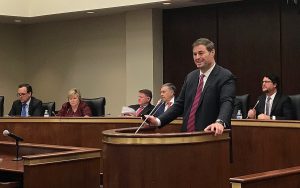
But House Speaker Murrell Smith described the move as legislative hostage-taking.
“Holding hostage bills like that only hurts South Carolinians,” Smith told reporters. “It doesn’t harm the members that they feel weren’t nice to them. It doesn’t harm the institution. It harms real South Carolinians.”
Smith then linked the Freedom Caucus’s conduct throughout the session to larger political forces that have been disruptive on the national level.
“It’s not lost on me that yesterday you see chaos created in Washington, DC, and the same agents who’ve been imported down to South Carolina try to create chaos on our floor and try to kill bills to get attention,” Smith said. “This is about governing, and I sure hope that we get back to governing and quit trying to get social media attention and clickbait.”
So what was achieved?
Despite the disappointments, GOP leaders pointed to what they saw as progress on major legislative priorities throughout the two-year session.
Abortion restrictions: Passed last year in the wake of the Supreme Court’s Dobbs decision overturning Roe v. Wade, the “Fetal Heartbeat Act” bans all abortions after the sixth week of pregnancy. A South Carolina woman is currently suing to extend the allowed time period.
Permitless carry: Dubbed “constitutional carry” by supporters, the law allows South Carolinians 18 and older without a criminal conviction to carry a handgun, openly or concealed without training or a permit. Police are barred from questioning a gun-carrying citizen without probable cause.
Gender care ban: Sent this week to the governor for signature, the “Help Not Harm Act” will outlaw medical interventions such as surgery, puberty blockers and cross-sex hormones for minors suffering from gender dysphoria. The law will also deny Medicaid benefits for such care to South Carolinians under the age of 26.
Internet pornography: Passed by the Senate on the last day of the session, the “Child Online Safety Act” requires pornographic websites to verify that users are 18 or older before displaying graphic content. Like similar bills in Louisiana and North Carolina, the law is expected to be challenged in federal court on First Amendment free speech grounds.
Judicial selection: Now headed to a conference committee to work out differences between House and Senate versions, the bill will reform a system of selecting judges that’s long been plagued by charges of corruption. Though details of the two bills vary at this point, the idea is to reduce the legislature’s now-absolute authority over appointments by giving the governor a larger voice in the process.
What’s left to do
With the legislature having now adjourned for the year “sine die” – a Latin phrase meaning “without a day” to return in regular session – members can only reconvene in 2024 in case of a fiscal emergency or to consider items that have already been passed by both chambers.
At the top of that list will be the $13 billion 2024-25 state budget, which passed the House and Senate with significant differences that will have to be hashed out in a conference committee.
Members are expected to meet in June to begin negotiations, which are expected to focus on two major items: a Senate provision to provide $175 million for a veterinary college at Clemson, and a House plan to spend $500 million on a one-time property tax rebate for South Carolina homeowners.
Until a final budget is passed, the state will operate under a continuing resolution that finances state government at current 2023-24 levels.
- Have a comment? Send to: feedback@statehousereport.com.
Big energy bill dies as session ends

By Jack O’Toole | A controversial, 70-page energy bill designed to increase Palmetto State power production effectively died on the floor of the S.C.a Senate this week. Members voted to replace the measure’s legally binding provisions with new language recognizing the need for future reform efforts instead.
In other words, they gutted the immediate impact of the bill, opting instead to simply say more power production was important. As a result, legislators are unlikely to debate the issue again until they reconvene for a new legislative session next January.
While there’s broad agreement that South Carolina, currently the nation’s fastest-growing state, will need to bring significant new power generation capacity online over the next decade, the House energy bill engineered by Speaker Murrell Smith, R-Sumter, has faced tough criticism from the start. Of particular concern have been provisions to weaken utility regulators at the Public Service Commission (PSC), fast-track large new natural gas plants and pipelines, and erect barriers to solar energy projects.
Critics of the legislation this week praised the Senate’s decision to delay further action until all energy alternatives had been considered and fully vetted.
“The Senate was wise to slow down,” said Eddy Moore, a greenhouse gas emissions expert with the Southern Alliance for Clean Energy. “Now, we need to streamline clean energy additions for the benefit of everyone in the state.”
Despite the controversy, Beaufort Republican Sen. Tom Davis, who authored the new non-binding language, says the House’s work was critical in setting the stage for future progress.
In particular, he notes, the new Senate language endorses the House bill’s basic framework by emphasizing the need for new power generation and transmission capacity, and acknowledging the importance of natural gas as a bridge to the future.
Bill critics like S.C. League of Women Voters Vice President Teague warned that the process next year will have to be more inclusive and sensitive to public concerns to win their support.
“The best thing about this Senate bill is that it doesn’t actually do any of the inadequately vetted things it talks about,” she said. “Going forward, we hope that legislators will understand that stakeholders participating in these discussions must include those of us concerned about protecting ratepayers and the public.”
In other recent headlines:
![]() Bill may lead to statue honoring Smalls. The S.C. General Assembly passed a bill this week to create an 11-member commission to install a statue on the Statehouse grounds to honor Robert Smalls, the Civil War hero and Black legislator. Smalls will be the first Black South Carolinian to be honored with an individual statue in that location.
Bill may lead to statue honoring Smalls. The S.C. General Assembly passed a bill this week to create an 11-member commission to install a statue on the Statehouse grounds to honor Robert Smalls, the Civil War hero and Black legislator. Smalls will be the first Black South Carolinian to be honored with an individual statue in that location.
S.C. students could be banned from using cell phones during school days. A proposed budget proviso would prohibit student cell phone use during school hours in South Carolina public schools.
Senate unanimously confirms Keel to keep leading SLED. Senators voted unanimously to give the state’s top cop another six-year term. “Retaining Chief Keel’s leadership and law enforcement expertise is a victory for our entire state,” said Gov. Henry McMaster.
Lawmakers debate bill that could restrict what can be taught in S.C. classrooms. With the legislative session officially over, members of the S.C. House and Senate will begin meeting soon to reconcile their differences on the Transparency and Integrity in Education Act, which both chambers have passed in slightly different forms.
A tinfoil hat and closed doors. Long-simmering tensions between House G.O.P. leaders and hard-right Freedom Caucus House members broke out into the open this week, as one mainstream conservative donned a tin-foil hat, and Caucus members’ insistence that a lengthy bill be read aloud led to a parliamentary showdown with Smith.
#@+*^$ Dominion
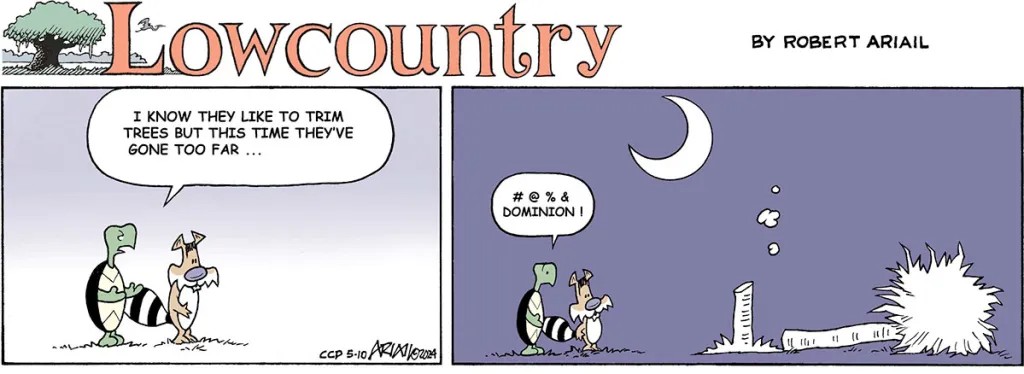
Nationally award-winning cartoonist Robert Ariail always has an interesting take. This week, he’s taking on the tree butchers along the coast that are empowered by Dominion Energy. What do you think – love the cartoon? Hate it? What do you think: feedback@statehousereport.com.
The most regressive legislative session in decades

By Andy Brack | The most regressive legislative session in a century just ended.
 On one hand, thank goodness. The amount of damage that state lawmakers can keep doing is now limited. All they’ve got left to do is deal with the $13 billion state budget in a conference committee plus some other matters.
On one hand, thank goodness. The amount of damage that state lawmakers can keep doing is now limited. All they’ve got left to do is deal with the $13 billion state budget in a conference committee plus some other matters.
But on the other hand, they proved this year they are hellbent on pushing us back to times when things were not too great for everyone in South Carolina.
With a supermajority in the S.C. House and almost the same in the state Senate, the Republican Party is firmly in control. And when its factions want to work together, they hurt South Carolinians. In this session, for example, they legislated discrimination in schools against LGBTQ+ students. They made the state less safe by allowing people to carry guns without permits. And by adopting an over-the-top abortion ban, they sent a clear message to the state’s women that they are second-class citizens.
“Most days it felt like we were racing to undo things we’d done less than a year ago,” observed state Rep. Spencer Wetmore, D-Charleston. “For example, undoing the open carry law we’d passed last year to race to permitless carry.
“Or undoing a limited income-based school voucher to move to an unlimited voucher system – which thankfully didn’t pass the Senate. All so we could prove to the 7% of South Carolinians who vote in Republican primaries how ‘conservative’ we are.”
If there’s one good outcome of the session, it’s something that lawmakers did not do yet – pass a controversial energy production bill pushed by House Speaker Murrell Smith, R-Sumter.
The bill, which faced withering criticism for its breadth and the speed that House members pushed it through without thorough consideration, would have had hugely negative impacts on South Carolina’s energy policy. Yes, it would have allowed much-needed energy production in the Palmetto State, but at the cost of a new large-scale natural gas plant and gas pipeline to Colleton County that would destroy too much land and open it to pollution. It would have created oversight issues at the state Public Service Commission. It would have allowed energy insiders to get their way without much public scrutiny. And it would have put barriers on some renewable energy projects.
But while that kind of dysfunctional karma had a good policy impact in this instance, the dark side won too much. Not only did state lawmakers fail again to pass a hate crimes law, but they again failed to show a little empathy for people suffering from pain by passing a long-proposed measure to allow medical marijuana.
Lawmakers also failed to pass a bill to allow liquor stores to open on Sunday. And as the clock wound down Thursday, one frustrated Republican lawmaker angry at being mocked by colleagues even blocked a bill to consolidate six health agencies into one.
That’s the kind of year it was. Legislators seemed to keep their eyes more on themselves than the people of the state and their general welfare.
Remember at the polls in November. But also remember to pick non-yahoo candidates.
Andy Brack is editor and publisher of Statehouse Report and the Charleston City Paper. Have a comment? Send to: feedback@statehousereport.com.
Riley Institute at Furman University
 The public spiritedness of our underwriters allows us to bring Statehouse Report to you at no cost. This week’s spotlighted underwriter is Furman University’s Riley Institute, which broadens student and community perspectives about issues critical to South Carolina’s progress. It builds and engages present and future leaders, creates and shares data-supported information about the state’s core challenges, and links the leadership body to sustainable solutions.
The public spiritedness of our underwriters allows us to bring Statehouse Report to you at no cost. This week’s spotlighted underwriter is Furman University’s Riley Institute, which broadens student and community perspectives about issues critical to South Carolina’s progress. It builds and engages present and future leaders, creates and shares data-supported information about the state’s core challenges, and links the leadership body to sustainable solutions.
Launched in 1999, the Institute is named for former South Carolina Governor and former United States Secretary of Education Richard W. (Dick) Riley. It is committed to nonpartisanship in all it does and to a rhetoric-free, facts-based approach to change.
- Learn more about the Riley Institute.
- Also learn more about the Riley Institute’s Center for Education Policy and Leadership.
Old white building
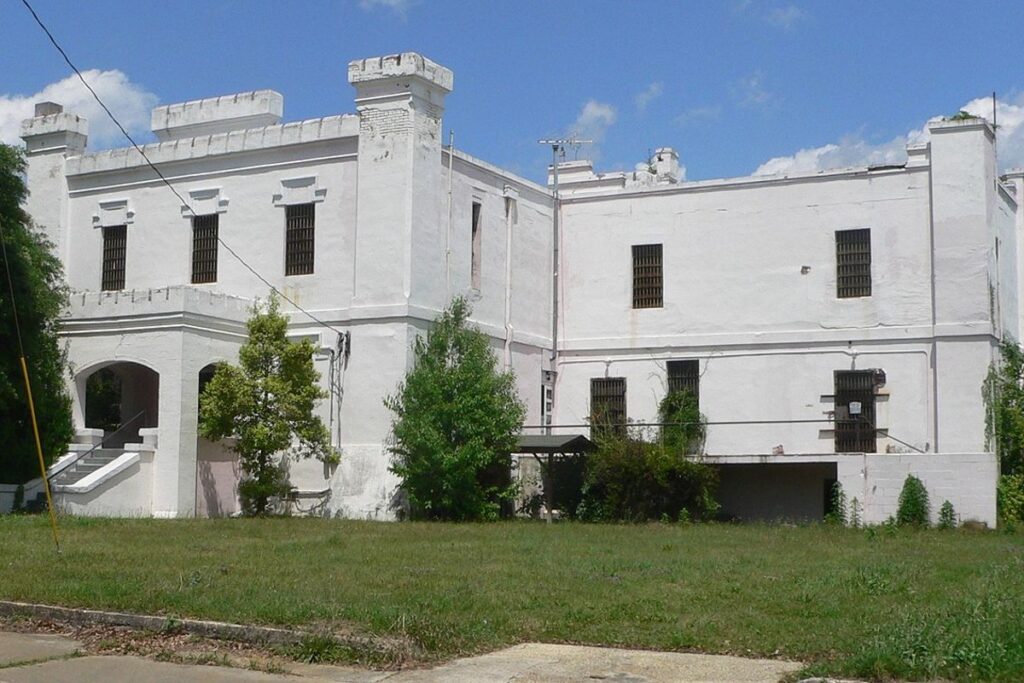
Here’s an interesting old white building. Where is it? What can you tell us about it? Send your name, hometown and guess to: feedback@statehousereport.com.
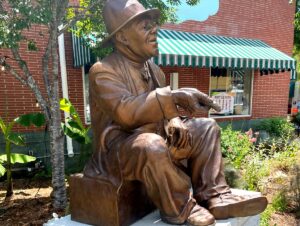
Last week’s mystery, “Sitting in a shady place,” was a photo taken by Barry Wingard of Florence that showed a bronze statue “Huey Cooper and His Lucky Rabbit’s Foot.” It’s in Lake City.
According to sleuth Allan Peel of San Antonio, Texas, “the sculpture was created by Alex Palkovich, a renowned sculptor originally born in the trans-Carpathian Mountains, now part of the Ukraine. He spent much of his career in Florence….
“The sculpture was installed on Sept, 10, 2014, to commemorate a beloved former resident, Huey Cooper, who was always cheerful and spent most days on a low, cement wall at the corner of Acline and Main streets where people could rub his lucky rabbit’s foot for a nickel.
“Huey died in 1978, but this statue will allow him to forever hold out his rabbit’s foot, and continue collecting a nickel from any luck-seekers who want to rub the rabbit’s foot for good luck. You can even put a nickel into a slot in the right pocket of the statue. While you could technically rub the rabbit’s foot without paying Huey, don’t expect any good luck to come from such a maneuver!”
Others who correctly identified the Huey statue were: George Graf of Palmyra, Va.; Pam Little-McDaniel of Florence; Penny Forrester of Tallahassee, Fla.; Steve Yarborough of West Columbia; Pat Keadle of Wagener; David Lupo of Mount Pleasant; Elizabeth Jones of Columbia; Linda Teachey of Okatie; Peggy Morrow of Lake City; Bill Segars of Hartsville; and Diane Graham.
- Send us a mystery picture. If you have a photo that you believe will stump readers, send it along (but make sure to tell us what it is because it may stump us too!) Send to: feedback@statehousereport.com and mark it as a photo submission. Thanks.
Send us your thoughts
We encourage you to send in your thoughts about policy and politics impacting South Carolina. We’ve gotten some letters in the last few weeks – some positive, others nasty. We print non-defamatory comments, but unless you provide your contact information – name and hometown, plus a phone number used only by us for verification – we can’t publish your thoughts.
- Have a comment? Send your letters or comments to: feedback@statehousereport.com. Make sure to provide your contact details (name, hometown and phone number for verification. Letters are limited to 150 words.
- ORDER NOW: Copies are in Lowcountry-area bookstores now, but if you can’t swing by, you can order a copy online today.
- Now available as an e-book!
ABOUT STATEHOUSE REPORT
Statehouse Report, founded in 2001 as a weekly legislative forecast that informs readers about what is going to happen in South Carolina politics and policy, is provided to you at no charge every Friday.
- Editor and publisher: Andy Brack, 843.670.3996
- Statehouse bureau chief: Jack O’Toole
Donate today
We’re proud to offer Statehouse Report for free. For more than a dozen years, we’ve been the go-to place for insightful independent policy and political news and views in the Palmetto State. And we love it as much as you do.
But now, we can use your help. If you’ve been thinking of contributing to Statehouse Report over the years, now would be a great time to contribute as we deal with the crisis. In advance, thank you.
Buy the book
Now you can get a copy of editor and publisher Andy Brack’s We Can Do Better, South Carolina! ($14.99) as a paperback or as a Kindle book ($7.99). . The book of essays offers incisive commentaries by editor and publisher Andy Brack on the American South, the common good, vexing problems for the Palmetto State and interesting South Carolina leaders.
More
- Mailing address: Send inquiries by mail to: P.O. Box 21942, Charleston, SC 29413
- Subscriptions are free: Click to subscribe.
- We hope you’ll keep receiving the great news and information from Statehouse Report, but if you need to unsubscribe, go to the bottom of the weekly email issue and follow the instructions.
- Read our sister publication: Charleston City Paper (every Friday in print; Every day online)
- © 2024, Statehouse Report, a publication of City Paper Publishing, LLC. All rights reserved.
















 We Can Do Better, South Carolina!
We Can Do Better, South Carolina!